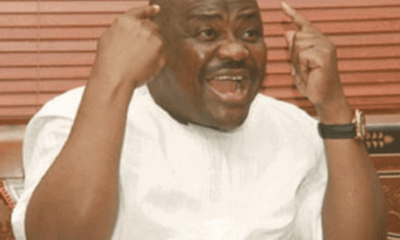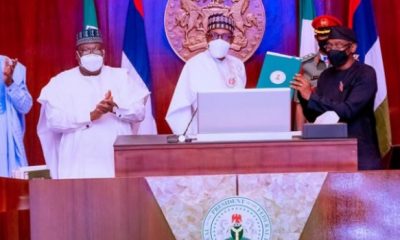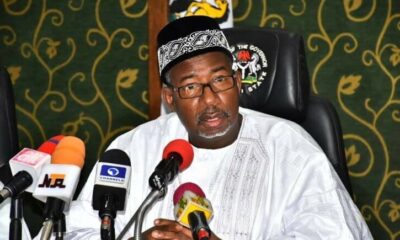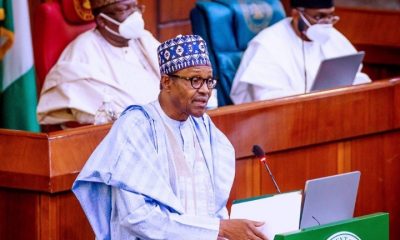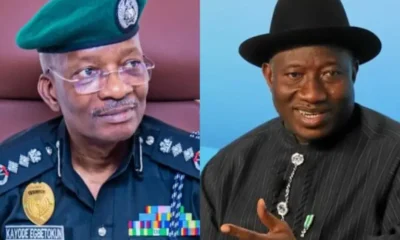Business
Presidency: Why Buhari Signed 2022 Budget Despite Insertion Of 6,576 New Schemes
Published
2 years agoon
By
Editor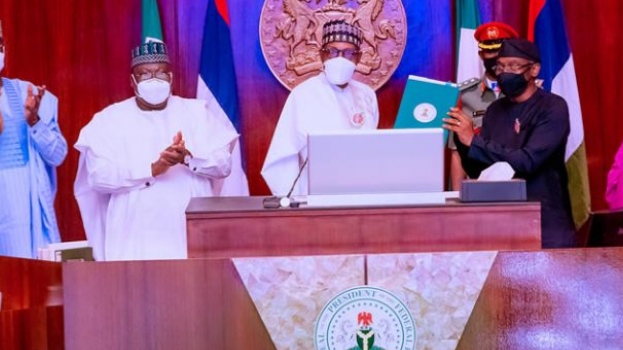
The Presidency Sunday night said that President Muhammadu Buhari signed the 2022 Appropriation Bill into law despite the insertion of 6,576 new schemes worth N37 billion because he did not want to “throw away the baby with the bathwater.”
According to a statement by Garba Shehu, Senior Special Assistant to the President (Media & Publicity) which gave the president’s rationale for the action, even though Buhari had a disagreement with the National Assembly over the changes made in the budget, he was not in conflict with the legislators.
The statement accused unnamed critics of deliberately trying to create a fiasco between the president and the legislature.
Explaining the need for the president to give his assent to the budget because of the other provisions contained in it, the statement said: “Given Mr President’s commitment to improving the lot of the Common Man, it was felt that it would not be wise to throw away the baby with the bathwater. “
READ ALSO: Wike Knocks Buhari For Signing 2022 Budget Despite ‘Worrisome’ Alterations
The statement further explained Buhari’s rationale for assenting to the bill: “Mr President was clear and candid in expressing his reservations with the numerous changes to the 2022 Budget made by the National Assembly, which would hamper its implementation.
“However, to respond to critics that question why assent to the Budget if it was so severely tampered with, we wish to respond as follows:
“Need to Save Value-Additive Projects, Programs & Policies:
“Although over 10,733 projects were reduced and 6,576 new projects were introduced into the budget by the National Assembly, there are tens of thousands more provisions in the 2022 Budget, all of which, when efficiently and effectively implemented, will have a significant developmental impact on the lives and livelihoods of ordinary Nigerians.”
“Ongoing Capital Projects, Critical Recurrent Votes, Priority New Projects – all feature in the 2022 Budget and Mr President’s forbearance in assenting to the Budget will save these provisions from implementation delays and other challenges.
“Dealing with Modern Democratic Norms:
“President Buhari is a democrat who deeply believes in the supremacy of the Constitution, with its checks and balances across the three arms of Government,” it added.
The Presidency maintained that while it is true that the president expressed disagreement with insertions and the other alterations, including the ‘reduction in the provisions for many strategic capital projects to introduce ‘Empowerment Projects,’ “innumerable lies are being spread about the President being ‘angry’ at, had ‘blasted’ or ‘lashed out’ at the Parliament.
“This cannot be farther from the truth.”
The statement pointed out that as the President of the Senate, Dr Ahmed Lawan said shortly after the budget-signing ceremony, disagreements as the ones listed by the president are normal in the everyday Executive-Parliamentary relationship because, as he explained, “executive and legislative judgements don’t always have to be the same.”
The statement added: “While we note that there are people who are trying to create a fiasco between the two arms of government on account of the budget, we assure that they will, in the end, be disappointed.
“The Executive and the 9th National Assembly have since moved away from the wild, destructive political games of the past, conducting themselves in a way that puts national interest supreme in their decisions.
“We doubt if there is a patriotic citizen who wants to see the return of the operating environment engendered by the 8th Senate when an elected government was held in chains, held hostage to the desperate political ambitions of a clique, and the public denied needed services including that which impinged on national security. Happily, the 9th National Assembly is more about policy than politics.
“Under the constitution, both arms of government are coequal and at the same time, independent and interdependent. The rule of the game is cooperation and the President, as a democrat fully accepts this.”
The Presidency affirmed that it is at the discretion of the National Assembly to override the president’s action where if he had vetoed the bill, a measure, it pointed out had not been exercised under the current dispensation.
The statement further said: “In terms of the passage of legislations like the Appropriation Act and other Money Bills, the National Assembly has equal responsibilities with the Executive.
“Indeed, if Mr President had declined assent to the 2022 Appropriation Bill, the National Assembly has powers to override the President’s veto if they can drum up a 2/3 majority vote. This is the constitution.
“Happily, this situation has not arisen during the tenure of Mr President’s Administration, and the Executive’s relationship with the Leadership of the 9th National Assembly is much improved over what happened with the 8th National Assembly.
READ ALSO: Buhari Lists 15 ‘Worrisome Changes’ To 2022 Budget By National Assembly
“It is on account of his confidence in the strength of this excellent working relationship that Mr President has directed that an Amendment Budget Proposal should be prepared and submitted to the National Assembly, once they return from their recess.
“It is hoped that the National Assembly will carefully consider and approve the 2022 Amendment Budget Proposals, once presented to them in due course, for the benefit of all Nigerians.
“It is important therefore that, in place of “anger” or confrontation, President Buhari showed the democracy-loving side of his personality as he signed the budget at the same time calling for dialogue with the parliament to resolve the contentious issues.
“The Presidency under Muhammadu Buhari and the parliament under Lawal and Gbajabiamila are committed to a good neighbourly relationship and this or any other disagreement between the two arms of government will not alter the dynamics of that relationship.”
(TRIBUNE)
You may like


Wike Knocks Buhari For Signing 2022 Budget Despite ‘Worrisome’ Alterations


Buhari Lists 15 ‘Worrisome Changes’ To 2022 Budget By National Assembly


VAT War Between FG, States Affected Our 2022 Budget Proposal – Bauchi Govt


Nigeria’s Budget 2022 And Debt Service Implication [ANALYSIS]


2022 Budget: BudgIT Raises Concerns, Queries Missing N198.7bn Oil Company Payments To NDDC


Full Speech Of President Buhari’s 2022 Budget Presentation

The Central Bank of Nigeria (CBN) started fresh and direct sales of US dollars at N1,021 per dollar to Bureau De Change operators.
Nigeria’s apex bank disclosed this in a circular signed by its Director of Trade and Exchange Department Hassan Mahmud.
“We write to inform you of the sale of $10,000 by the Central Bank of Nigeria (CBN) to BDCs at the rate of N1,021/$1. The BDCs are in turn to sell to eligible end users at a spread of NOT MORE THAN 1.5 percent above the purchase price,” the circular posted on its website read.
READ ALSO: Tinubu Unveils African Counter-Terrorism Summit
“ALL eligible BDCs are therefore directed to commence payment of the Naira deposit to the underlisted CBN Naira Deposit Account Numbers from today, Monday, April 22, 2024, and submit confirmation of payment, with other necessary documentations, for disbursement of FX at the respective CBN Branches.”
CBN’s move is coming as the naira is recording a slight depreciation against the dollar after weeks of gains.
In late March, the bank also sold $10,000 to each of the eligible Bureau De Change (BDC) operators in the country at the rate of N1,251/$1.
READ ALSO: Mixed Reactions Trail Video Of Couple’s Customised N200 Notes
Like in the most recent sales, it warned BDCs against breaching terms of the dollar sales, vowing to sanction defaulters “including outright suspension from further participation in the sale”.
The fortunes of the naira have fallen sharply since President Bola Tinubu took over in May. Inflation figures have reached new highs and the cost of living hitting the rooftops.
Nigeria’s currency slid to about N1,900/$ some months ago at the parallel market. But in recent weeks, it has gained against the dollar.
The Nigerian authorities have also doubled down on their crackdown against cryptocurrency platform Binance and illegal BDCs.
On March 1, the CBN revoked the licences of 4,173 BDCs over compliance failures.
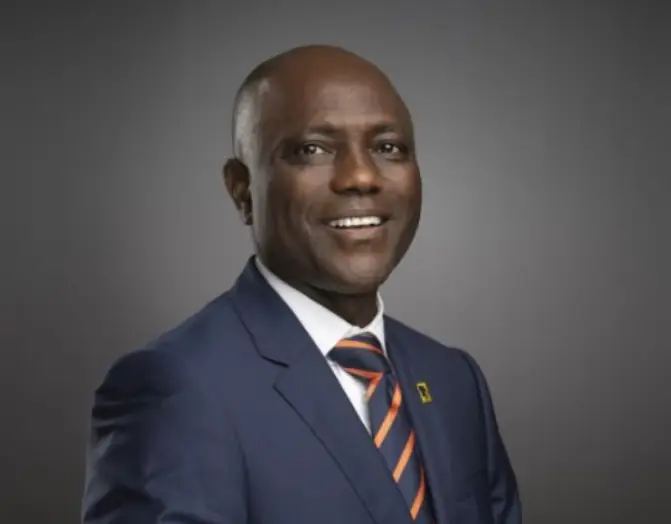
Olusegun Alebiosu has been appointed as the Acting Managing Director/Chief Executive Officer of First Bank of Nigeria Limited (FirstBank Group), effective April 2024.
Alebiosu steps into this pivotal role from his previous position as the Executive Director, Chief Risk Officer, and Executive Compliance Officer, a position he held since January 2022.
Alebiosu brings to the helm of FirstBank over 28 years of extensive experience in the banking and financial services industry. His expertise spans various domains including credit risk management, financial planning and control, corporate and commercial banking, agriculture financing, oil and gas, transportation, and project financing.
READ ALSO: JUST IN: Access Holdings Names New Acting CEO
Having embarked on his professional journey in 1991 with Oceanic Bank Plc. (now EcoBank Plc.), Alebiosu has held several notable positions in esteemed financial institutions.
Prior to joining FirstBank in 2016, he served as Chief Risk Officer at Coronation Merchant Bank Limited, Chief Credit Risk Officer at the African Development Bank Group, and Group Head of Credit Policy & Deputy Chief Credit Risk Officer at United Bank for Africa Plc.
Alebiosu’s academic credentials further enrich his professional profile. He is an alumnus of the Harvard School of Government and holds a Bachelor’s degree in Industrial Relations and Personnel Management. Additionally, he obtained a Master’s degree in International Law and Diplomacy from the University of Lagos, as well as a Master’s degree in Development Studies from the London School of Economics and Political Science.
READ ALSO: Meet Newly Appointed Union Bank CEO
A distinguished member of various professional bodies, including the Institute of Chartered Accountants (FCA), Nigeria Institute of Management (ANIM), and Chartered Institute of Bankers of Nigeria (CIBN), Alebiosu is renowned for his commitment to excellence and ethical practices in the banking sector.
Beyond his professional endeavors, Alebiosu is known for his passion for golf and adventure. He is happily married and a proud parent.
With Alebiosu’s appointment, FirstBank of Nigeria Limited anticipates continued growth and innovation under his leadership, reinforcing its position as a leading financial institution in Nigeria and beyond.
Business
CBN Gives New Directive On Lending In Real Estate
Published
1 week agoon
April 17, 2024By
Editor
The Central Bank of Nigeria, CBN, has released a new regulatory directive to enhance lending to the real sector of the Nigerian economy.
The directive, issued on April 17, 2024, with reference number BSD/DIR/PUB/LAB/017/005 and signed by the Acting Director of Banking Supervision, Adetona Adedeji, signifies a notable shift in the bank’s policy towards a more contractionary approach.
In line with the new measures, the CBN has reduced the loan-to-deposit ratio by 15 percentage points, down to 50 per cent.
This move aligns with the CBN’s current monetary tightening policies and reflects the increase in the Cash Reserve ratio rate for banks.
READ ALSO: JUST IN: CBN Gov Sacks Eight Directors, 32 Others
The LDR is a metric used to evaluate a bank’s liquidity by comparing its total loans to its total deposits over the same period, expressed as a percentage.
An excessively high ratio may indicate insufficient liquidity to meet unexpected fund requirements.
All Deposit Money Banks are now mandated to adhere to this revised LDR.
The CBN has stated that average daily figures will be utilised to gauge compliance with this directive.
Furthermore, while DMBs are encouraged to maintain robust risk management practices in their lending activities, the CBN has committed to continuous monitoring of adherence and will adjust the LDR as necessary based on market developments.
READ ALSO: JUST IN: CBN Increases Interest Rate To 24.75%
Adedeji has called on all banks to acknowledge these modifications and adjust their operations accordingly. He emphasised that this regulatory adjustment is anticipated to significantly influence the banking sector and the wider Nigerian economy.
The circular read in part, “Following a shift in the Bank’s policy stance towards a more contractionary approach, it is crucial to revise the loan-to-deposit ratio policy to conform with the CBN’s ongoing monetary tightening.
“Consequently, the CBN has decided to decrease the LDR by 15 percentage points to 50 per cent, proportionate to the rise in the CRR rate for banks.
“All DMBs must maintain this level, and it is advised that average daily figures will still be applied for compliance assessment.
“While DMBs are urged to sustain strong risk management practices concerning their lending operations, the CBN will persist in monitoring compliance, reviewing market developments, and making necessary adjustments to the LDR. Please be guided accordingly.”

Three Suspected Pipeline Vandals Caught In Edo
Cultists Arrested For Invading Anambra Hotel With Charms

LASTMA, Viju Officials Clash Leaves 10 Injured
Trending

 Entertainment5 days ago
Entertainment5 days agoBridesmaids’ Dance At Wedding Causes Stir On Social Media [VIDEO/PHOTOS]

 Metro5 days ago
Metro5 days agoVIDEO: ‘UNN Lecturer’ Caught Pants Down With Married Student

 News3 days ago
News3 days agoDrama! Supporters Of Yahaya Bello Perform Rituals to Prevent His Arrest By EFCC [Video]

 Headline3 days ago
Headline3 days agoDrama As Women Fight Dirty, Breasts Fall Out During Spring Break Outing In US [PHOTOS/VIDEO]

 News3 days ago
News3 days agoVIDEO: Force PRO Orders Arrest Officers Caught On Video Bashing Driver’s Car

 Entertainment3 days ago
Entertainment3 days agoNollywood Actor, Zulu Adigwe Is Dead

 Headline3 days ago
Headline3 days agoMeet 17-year-old Nigerian Who Won $3.5m Worth Of Scholarships From Harvard, 13 Other Foreign Universities

 Metro3 days ago
Metro3 days agoEdo Cultists Kill Rival In Daughter’s Presence, Abandon Getaway Car

 News5 days ago
News5 days agoIGP, Jonathan Disagree Over State Police

 Headline3 days ago
Headline3 days agoVideo Of Girl Being Bullied, Slapped At Lead British School Sparks Outrage Online [PHOTOS/VIDEO]
